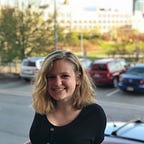Adaptive Space Series 2
Co-Initiating and Inviting
Captures from our first studio gathering on Feb. 19, 2021
As Gemma, Erika, and I prepared for the studio, we were curious to find out not only how our practice group members felt about the beginning of this u.lab 2x cycle, but also to see where they were on their journey of developing a social change-centered prototype. To complement the u.lab 2x materials on co-initiating, , we introduced the chaordic stepping stone model, with a special focus on the “need” and “people” part of the Inviting section.
Our Process
Check-In/Excitements/Concerns
We facilitated our check in with the “traffic light” where members responded “red”, “yellow”, or “green” to the question of how they were feeling about their current position in their prototype journey. We were delighted to see that everyone was either “yellow” or “green.” Though it was wonderful to see so many people were excited about their progress, we made it a point to talk through the challenges and reservations members were having, too.
It was amazing to hear how inspiring the u.lab live session was for so many studio members (I felt inspired, myself). We talked through how we might use other u.lab members’ stories as inspiration for our own, and not as comparisons. Some recurring concerns about this portion of the u.lab 2x cycle included apprehensions about team-building and asking too much of others while being unsure of your own end goal. One sound piece of advice to abate this apprehension is that participating on a u.lab team is low-risk, with potentially very high rewards!
Fishbowl
After our check-in, we implemented a “fishbowl” method of conversation to allow studio members to pop in and out of discussion and talk about anything Theory U-related, including the live session content, the Theory U process, and what it feels like to be a member of both our local and international communities.
Some beautiful and important ideas arose, including:
- Viewing the entirety of the international u.lab community as an extended family tree, with our local Adaptive Space groups as immediate family.
- Where is the middle ground between having too much direction (not enough freedom) and not enough direction (too much freedom), as it pertains to following the u.lab process?
- Is change work “lonely work”? Does it have to be?
Generating Need Statements/Conversation Cafe
After our fruitful fishbowl discussion, we took some time to reflect on our own prototyping journeys and generate need statements. These need statements are meant to serve as the seed which inspires our team-building and prototyping processes. After small-group discussions on our statements, we opened the group back up to allow for studio-wide sharing.
Here are some of the need statements that we harvested:
- “Need to develop a framework/resource pool for student organizations interested in social change work.”
- “I need a better way to explain a very complicated project already on course, I think I’ll look for a story instead of a better explanation.”
- “Create a space to facilitate the experience of oneness — joyfully and having fun accompanied by some description? thought-provoking questions? that can accompany that experience and anchor it better.”
- “Need to explore what the church might look like today as opposed to how it looked a hundred years ago, specifically how it organizes for the good of the world.”
- “Building a framework for “DEI” -and explaining it and how it will be applied is extremely hard — turning to stories instead for people to make sense of it.”
- “To curate opportunities for bringing embodied creativity, connection and well being in support of agency and voice.”
- “To create a container for unlikely partners throughout Appalachia — construction trades labor unions, environmental advocates, social justice advocates, anti-racist advocates, university researchers, and others — to gather in a meaningful way to build trust and long-term relationships to facilitate the transition to the clean energy economy and green jobs in this often-forgotten region.”
- “People need self (body mind heart spirit) and the connection to address personal sadness, etc. and build teams that can work to liberate and transform in bigger areas via creative movement, dance, and play.”
From these, some important observations were made (thanks, Marc Rettig!). One is that “need” can be a narrow lens, fixing our gaze on what’s wrong or broken. Another is that we need to be careful about stating needs in terms of our solutions.
Check-Out
As we wrapped up our discussion on need statements, many members expressed their relief at having been able to discuss their reservations about team-building and the u.lab 2x process openly and honestly. Instead of viewing the Practice Group as a place to bring fully fleshed-out ideas and compare progress, we decided that the Group is better described as a place to “explore playfully” — as Marc put it, “we are playing the game of co-creation”!
This first session was an exciting way to begin practicing the principles of u.lab prototyping — but more exciting was the opportunity to see where others are and meet them there. As many members of the Group expressed, it’s easy to feel like others have made more progress, have better ideas, or know more than you do. But getting a small group of inspired individuals together and finding out that we have the same obstacles and reservations was a critical step in transforming this Practice Group into a judgment-free space in which everyone can share their work and ask questions openly. I’m so excited to see what we all accomplish!
